The Westhampton Beach Library board yesterday took copies of legal filings and other papers on the eruv dispute from odwyerpr.com but may or may not make them available to library users.
The Southampton Library earlier this week took a similar set of papers from O'Dwyer reps and said they would be made a "vertical file" in the library. There will no visible notice that they are available.
Joan Levan, president of the WHB library board and a past trustee of WHB, conducted yesterday's meeting and allowed brief presentations by two local residents who are acting as correspondents for odwyerpr.com. She said the board would not discuss the papers but would take up the topic later.
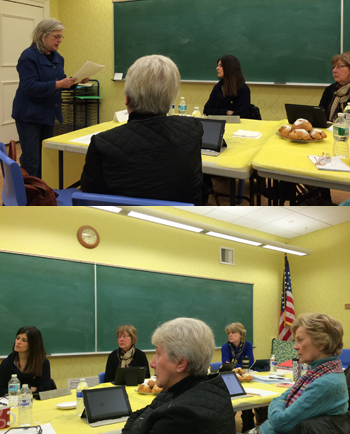 WHB board members Jennifer Mendelson, Marthe-Ann Betjemann, Karen Andrews, Joan Levan, and June Sellin. Photos: Debbie Giammarco WHB board members Jennifer Mendelson, Marthe-Ann Betjemann, Karen Andrews, Joan Levan, and June Sellin. Photos: Debbie Giammarco |
Other trustees are WHB Mayor Marie Moore, Karen Andrews, Jennifer Mendelson, June Sellin and Marth-Ann Betjemann. There are no males on the board.
Moore's husband, Thomas, operates a blog that reports on village activities.
Thomas, a lawyer who has served as law clerk to a sitting Suffolk County Supreme Court Judge, was appointed to the Westhampton Beach Village Zoning Board of Appeals in 2008. He resigned in 2010, three years before his term was up. Moore authored "controversial resolutions" during his time on the board, according to local blogger Dean Speir, including one that barred then-Village Attorney Hermon "Bo" Bishop for allegedly sharing his legal opinions in public.
What Is a Tinyurl?
Mayor Moore yesterday asked for an explanation of the tinyurl nggkjnh that odwyerpr.com has created as an "exhibit" on the eruv issue. Those initials, when preceded by http://tinyurl.com, connect to an online "library" of 20 items on the eruv dispute that can be accessed via this link.
A tinyurl is a short key to a vast, even infinite online library and database. It allows people to have "libraries" in their pockets. Tinyurls shorten URLs that could be more than 200 characters long. This makes for easy insertion in stories, emails, etc. Online stories often contain 15-20 such links. Online journalism can thus be far superior to anything in print. Print media can play catch-up by inserting tinyurl codes in their stories.
The tinyurl to the O'Dwyer exhibit on the eruv battle not only goes to 20 legal papers, media coverage, Wikipedia entries, opinions, etc., but to dozens of links that are in each of those 20. The exhibit is being expanded as new developments occur.
Both libraries and newspapers have been bypassed technologically by the web. Newspapers are coping with the revolution by having online versions. Unfortunately, more than half of the ad revenues that newspapers used to have did not follow online. Ad revenues crashed from $47 billion in 2006 to $23B currently including online revenues.
The seven letters that link to the odwyerpr.com eruv exhibit should be on display in the libraries of WHB, SH and Quogue. Their towns are under an all-out legal assault that has already cost them $884,837 in fees to outside law firms. Jewish People Opposed to the Eruv have spent another $100K+ on their lawyers, bringing the total bill to the $1 million mark.
Towns Threatened with Millions of Penalties
Marvin Tenzer, attorney for the East End Eruv Assn., which is pursuing three Federal lawsuits against the towns, said in 2011 that victory by the EEEA could bring a "multi-million dollar award."
Robert Sugarman, lead attorney for Weil, Gotshal & Manges for the EEEA, told 27east.com Feb. 4 that while the firm is working "pro bono" for the EEEA there has been "a significant expenditure of time and numerous court fees and we will seek to be reimbursed for those costs."
What is involved is the claim that by not allowing an eruv boundary, SH, WHB and Quogue are, in the words of the suit, "denying plaintiffs their rights to freely practice their religion."
Towns Blamed for Stressing Wheelchair Users
Plaintiff Deborah Pollack says she "cannot push her mother to synagogue, and her mother must therefore remain home on the Sabbath and Yom Kippur," which is said to be "especially painful since she cannot participate in the traditional memorial (‘Yizkor') service for her late husband."
Plaintiff Simcha Pollack "cannot push his elderly father to the synagogue in his wheelchair. Because he cannot attend a synagogue, Mr. Pollack's father—who is an ordained rabbi—refuses to spend the Sabbath or Yom Kippur with Mr. Pollack," says the lawsuit.
SH, WHB and Quogue residents are portrayed as mean and even anti-Semitic because they won't allow an artificial boundary called an eruv to be erected in their communities.
The only reason Deborah Pollack's mother must remain home on the Sabbath is because of Orthodox rules and not anything WHB is doing. The solution lies with the Orthodox religion and not markers on government property.
The Orthodox insist that there can be no breaches in an eruv. All parts of the barrier must be working for it to be valid. A Rabbi inspects an eruv each Friday morning to insure that all the lechis and wires are in place.
That same principle applies to our Constitution. Any breach in it is a serious matter and cannot be tolerated. The word "god" is not in the Constitution because the founders believed in the absolute separation of church and state. They wanted America to be a secular society. Allowing Orthodox symbols on public property is unconstitutional.
Some Urge "Activist" Libraries
"Libraries should be open to all—except the censor," said President John F. Kennedy. "We must know all the facts and hear all the alternatives and listen to all the criticisms. Let us welcome controversial books and controversial authors.For the Bill of Rights is the guardian of our security as well as our Library."
Gordon M. Conable, VP of Library Systems & Services, Inc., library management service, Riverside, California, urges libraries to get involved in public debate and discussion.
He continues:
"Libraries are storehouses and access-distribution-and-retrieval centers for an exploding body of human knowledge and opinion.
"The concept of informed consent only has meaning if the full range of human ideas is accessible to the people. The proponents of the various points of view must be able to make their cases fully and openly, however popular or unpopular they may be, before the individual and collective judgment of their fellow citizens.
"This principle is embodied in the First Amendment to the Constitution, which protects the free expression of ideas: Congress shall make no law respecting an establishment of religion, or prohibiting the free exercise thereof; or abridging the freedom of speech, or of the press; or the right of the people peaceably to assemble, and to petition the government for a redress of grievances."
By providing the information and resources necessary for open, free, and unrestricted dialogue on all issues of concern, the public library preserves these freedoms.
Conable served on the Board of the Freedom to Read Foundation 1988–95, and 2002–3 and is currently the Foundation's President. He was Chair of the ALA Intellectual Freedom Committee 1989–91and served on the Committee from 1987–91.


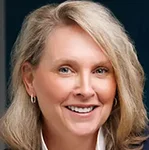 Maggie Moran, who is well-connected in New Jersey and New York Democratic politics, has established Moxie Strategies in Asbury Park, NJ.
Maggie Moran, who is well-connected in New Jersey and New York Democratic politics, has established Moxie Strategies in Asbury Park, NJ.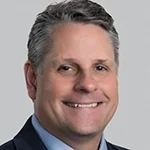 Husch Blackwell Strategies has added FleishmanHillard alum Michael Slatin as a principal in its public affairs group.
Husch Blackwell Strategies has added FleishmanHillard alum Michael Slatin as a principal in its public affairs group.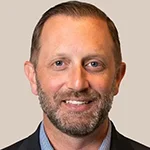 Rory Cooper, a veteran Republican operative and policy specialist, has joined Teneo’s Washington office as senior managing director in its strategy & communications practice.
Rory Cooper, a veteran Republican operative and policy specialist, has joined Teneo’s Washington office as senior managing director in its strategy & communications practice.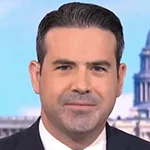 Brian Fallon, who served as national press secretary for Hillary Clinton’s 2016 presidential run, is signing on next month as Vice President’s Kamala Harris’ campaign communications director.
Brian Fallon, who served as national press secretary for Hillary Clinton’s 2016 presidential run, is signing on next month as Vice President’s Kamala Harris’ campaign communications director. TikTok is nothing more than a Chinese propaganda tool that poses “a grave threat to America’s national security and, in particular, impressionable children and young adults,” say two Congressmen who want the platform registered as a foreign agent.
TikTok is nothing more than a Chinese propaganda tool that poses “a grave threat to America’s national security and, in particular, impressionable children and young adults,” say two Congressmen who want the platform registered as a foreign agent.


 Have a comment? Send it to
Have a comment? Send it to 
No comments have been submitted for this story yet.